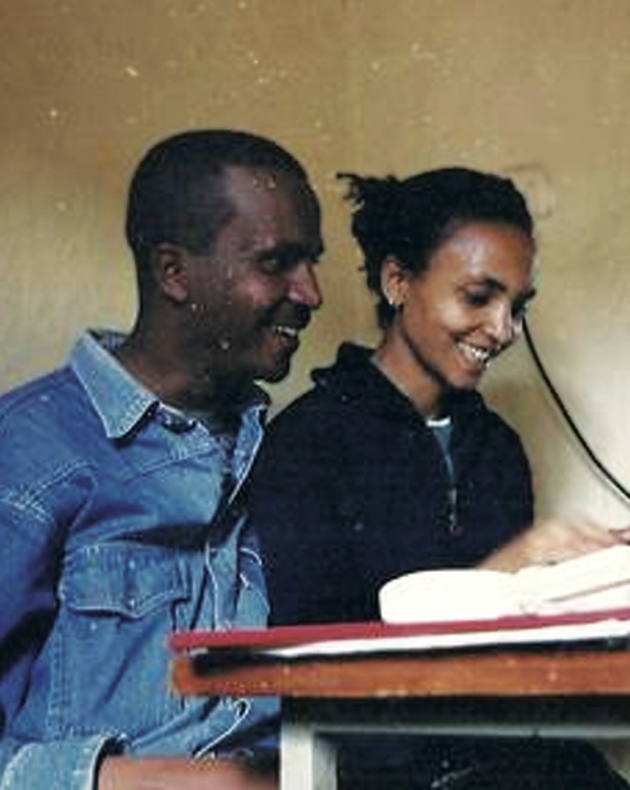This letter will appear in the August 16, 2012 issue of The New York Review.
To the Editors:
On June 27, 2012, the Ethiopian high court convicted journalist Eskinder Nega and twenty-three others on vague terrorism charges, continuing a trend in which Prime Minister Meles Zenawi jails his critics as “terrorists” for exercising rights guaranteed under the Ethiopian constitution.1
Eskinder Nega, who received this year’s PEN/Barbara Goldsmith Freedom to Write Award, has been a leading voice for press freedom in Ethiopia for almost two decades. He has been repeatedly detained, imprisoned with his wife Serkalem Fasil on treason charges, and denied a license to practice journalism.2 Two years ago, on the eve of Prime Minister Meles’s visit to Columbia University, the couple described their struggle in a letter to university President Lee C. Bollinger:
We are banned Ethiopian journalists who were charged with treason by the government of Prime Minister Meles Zenawi subsequent to disputed election results in 2005, incarcerated under deplorable circumstances, only to be acquitted sixteen months later, after Serkalem prematurely gave birth in prison.
Despite Serkalem’s difficult pregnancy, both of us managed to keep detailed notes of the sham trial while it was in progress, which were smuggled out of prison. The notes were swiftly altered into a 1000-page bookand rushed to a printer for publication.…
Fifteen days later we received an unexpected call from a much-traumatized proprietor of the printing press, who returned our manuscript and deposit, explaining that he had been visited by members of the Ethiopian security, who explicitly threatened his life should he fail to halt printing of the book.
Such is the government that PM Meles Zenawi leads.
A few months later we applied for a press license to resume our work as journalists after fulfilling all legal requirements. To the surprise of even the government’s apologists, we and others were officially denied press licenses that are our due by virtue of the constitution and the press law.3
On July 13, Eskinder Nega was sentenced to eighteen years in prison. This is the latest escalation of a long campaign to replace “one of Africa’s most fiery free presses,” as Eskinder wrote in that letter, “with a token press that is cowed in every sense of the word.”
We call on President Obama and all world leaders to condemn Eskinder’s imprisonment, and to join the US State Department, the African Commission on Human and Peoples’ Rights, and three UN special rapporteurs in denouncing the use of terrorism charges to jail journalists and others who are exercising their universally-guaranteed right to freedom of expression in Ethiopia.4
William Easterly
Professor of Economics
Co-Director
Development Research Institute
New York University
New York City
Peter Godwin
President
PEN American Center
New York City
Aryeh Neier
President Emeritus
Open Society Foundations
New York City
Kenneth Roth
Executive Director
Human Rights Watch
New York City
Joel Simon
Executive Director
Committee to Protect Journalists
New York City
-
1
“Ethiopia court finds 24 guilty of terrorism,” AFP, June 27, 2012. See also “Ethiopian blogger Eskinder Nega ‘guilty of terror link’” BBC News, June 27, 2012; “Blow to press freedom as Ethiopia convicts 24 of plotting rebellion,” The Guardian, June 28, 2012; and “The Case of Eskinder Nega,” William Easterly, Mark Hamrick, Aryeh Neier, Kenneth Roth, Joel Simon, The New York Review, January 12, 2012. ↩
-
2
“Imprisoned Ethiopian Journalist Is Honored With PEN Award,” The New York Times, May 2, 2012. ↩
-
3
“Letter from Ethiopia to Columbia University,” Eskinder Nega, September 20, 2010. ↩
-
4
U.S. Department of State statement on Eskinder Nega’s conviction. See also “Statement Of Senator Leahy On The Assault On Freedom Of The Press In Ethiopia”; and “Ethiopia’s anti-terrorism laws must not be misused to curb rights – UN,” February 2, 2012. ↩




